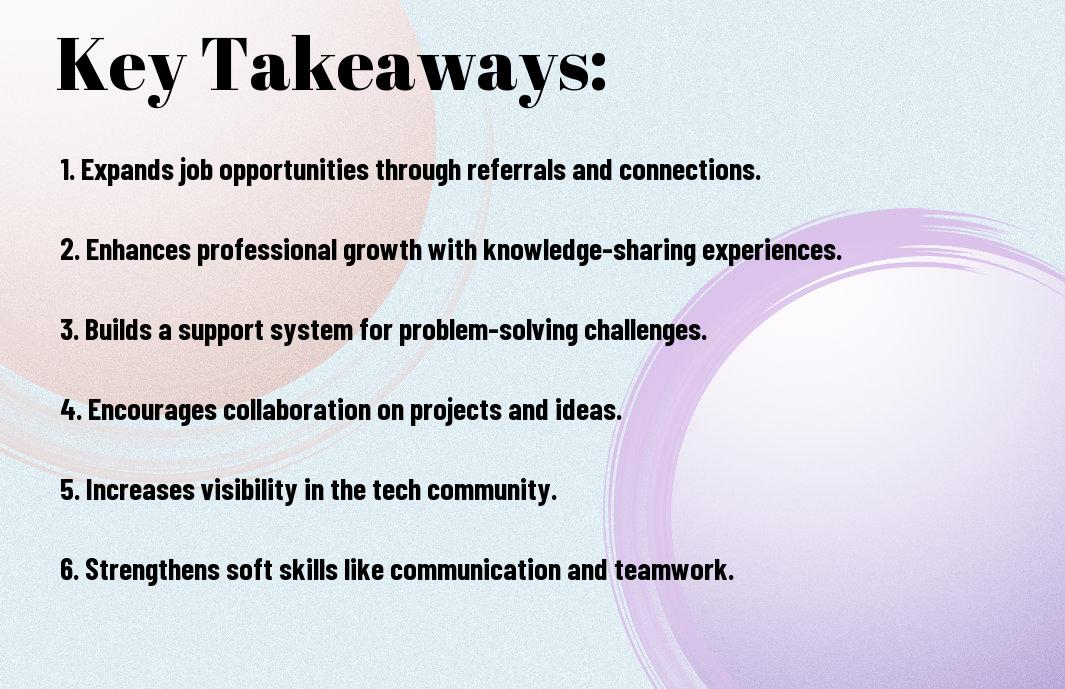Networking is vital for software engineers looking to advance their careers and stay ahead in the fast-paced technology landscape. By fostering meaningful relationships with peers and industry leaders, you create opportunities for collaboration, learning, and growth. Engaging in networking can lead to job offers, mentorship, and insights into emerging trends, making it an invaluable investment in your professional journey. However, neglecting these connections may leave you isolated and unaware of critical developments in the software engineering field. Your network is a powerful asset—nurture it.
Key Takeaways:
- Networking opens doors to job opportunities, collaborations, and mentorship, enhancing career growth for software engineers.
- Building meaningful connections within the tech community fosters knowledge sharing and provides access to industry insights and trends.
- Engaging in networking activities, such as meetups and conferences, helps engineers develop their communication skills and expand their professional circle.

The Value of Networking for Software Engineers
Before stepping into the technical aspects of programming, it is imperative to acknowledge the undeniable significance of networking in shaping a successful career as a software engineer. Your connections can often serve as the bridge between you and the next big opportunity, whether it’s landing a dream job, finding a mentor, or gaining access to resources that can enhance your skills. In an industry that thrives on collaboration and innovation, fostering professional relationships can facilitate your growth and open doors that you may not have realized existed.
Enhancing Career Opportunities
Networking is a powerful tool that can elevate your career opportunities in the software engineering field. By building crucial connections with peers, industry leaders, and potential employers, you can gain insights into job openings that may not be publicly advertised. These relationships can often lead to referrals, which significantly increase your chances of securing an interview. In addition, networking allows you to learn about the skills and qualifications that are currently in demand within the industry, thereby helping you to tailor your professional development to better align with market trends.
Gaining Industry Insights
One of the most rewarding aspects of networking is the wealth of industry insights you can acquire. When you engage with professionals who have experienced different facets of the software engineering landscape, you expose yourself to valuable information about emerging technologies, best practices, and potential pitfalls to avoid. These interactions not only broaden your knowledge base but also enhance your ability to make informed decisions in your own career. The perspectives you gain through networking can keep you ahead of the curve, ensuring that you remain relevant and competitive in an ever-evolving field.
It is crucial to recognize that networking goes beyond simply exchanging business cards or LinkedIn connections; it involves building genuine relationships that foster trust and collaboration. As you engage with others in the industry, you’ll uncover trends, share experiences, and even discover job leads that can significantly impact your career trajectory. The insights gained from these connections could be the difference between stagnating in your career or propelling yourself into exciting new opportunities. Embrace every chance to connect and learn from your network—your future self will thank you.
Building a Professional Network
Some might underestimate the value of a well-structured professional network. However, as a software engineer, establishing connections can significantly enhance your career trajectory. Building a robust professional network allows you to collaborate with peers, share ideas, and stay informed about the latest advancements in technology. It’s about more than just gaining access to job openings; it’s about creating genuine relationships that can lead to mentorship opportunities and innovative collaborations that can benefit your career in the long run.
Identifying Key Contacts
Below are various strategies to identify key contacts that could enrich your professional network. Start by focusing on people who share similar interests or expertise within your industry. This can include fellow engineers, product managers, tech leads, or even executives at companies you’re interested in. Attend industry conferences, workshops, and local meet-ups to meet potential contacts in person; engaging with them on a personal level can make a lasting impression. Take the time to research individuals in your desired areas of growth and make a list of those you aspire to connect with, so that you can actively seek out conversations and shared experiences.
Leveraging Social Media Platforms
Any successful networking strategy today involves utilizing various social media platforms effectively. By curating your profile on sites like LinkedIn, GitHub, or Twitter, you position yourself as an engaged and informed professional in your field. Actively participate in discussions, share your projects, and follow industry leaders to build your online presence. Engage with content related to your interests, comment on posts, and join relevant groups to connect with others who have similar passions. Such interactions can create a dynamic network and open doors to new opportunities that may have remained inaccessible otherwise.
For instance, when you actively contribute to discussions on platforms like LinkedIn, it’s important to highlight your skills and accomplishments while being authentic. A well-crafted post about a project you’re passionate about can attract the attention of recruiters or industry veterans. By sharing insights or challenges you overcome, you showcase your expertise and willingness to collaborate. Always ensure your interactions maintain a professional tone, and be mindful that your online presence can have a lasting impact on your reputation in the industry as a whole.
Networking Strategies and Best Practices
Many software engineers find that building a robust network is crucial for personal and professional growth. One of the most effective ways to expand your connections is by attending industry events, where you can physically meet peers, mentors, and potential collaborators. These gatherings often include conferences, meetups, and workshops tailored to your specific interests within the tech field. Here, you can engage in meaningful conversations, exchange ideas, and forge lasting relationships, all of which can greatly benefit your career.
Attending Industry Events
Strategies for maximizing your presence at industry events include doing adequate research on the event beforehand and identifying key speakers or sessions that align with your interests. Bring along your business cards to facilitate easy sharing of your contact information, and don’t shy away from introducing yourself to fellow attendees. Asking questions during Q&A sessions can also help you stand out, making people more likely to remember you. Engaging in post-event discussions on social media can further strengthen the connections you’ve established.
Participating in Online Communities
To expand your network in the digital world, it’s important to actively participate in online communities such as forums, social media groups, and platforms like GitHub. These environments provide opportunities not only for networking but also for collaboration on projects and sharing knowledge. Engage by contributing to discussions, sharing your insights, and asking questions to establish your presence. Over time, this participation can lead to valuable connections with professionals who share similar interests and goals in the software engineering landscape.
This approach to networking is particularly effective because it allows you to connect with diverse individuals across geographical boundaries. By sharing your experiences and expertise in online communities, you can not only learn from others but also position yourself as a valuable member of the community. As you invest time in nurturing these digital relationships, you’ll discover that they can lead to job opportunities, collaborations, and mentorship openings, making your network an crucial asset in your career development. Just be mindful that while online interactions can be powerful, they should complement, not replace, face-to-face networking efforts you engage in at industry events.
Maintaining and Nurturing Connections
Your ability to maintain and nurture connections can significantly influence your success as a software engineer. Building relationships is not a one-off event; it is an ongoing process that requires patience, effort, and genuine interest. By regularly reaching out and engaging with your professional contacts, you create a community around yourself that values collaboration and support. This interaction can manifest in various ways, such as attending industry events, participating in online forums, or simply scheduling a quick catch-up over coffee. It’s about keeping the lines of communication open and showing appreciation for the connections you’ve made.
Follow-Up Techniques
Between meetings and events, it’s important to employ effective follow-up techniques to ensure your connections remain strong. A quick thank-you note after a meeting or an email checking in can go a long way in reminding your contacts of your genuine interest. Personalizing your follow-ups by referencing specific discussions you’ve had or resources shared can also help solidify your relationship. The objective is to be proactive without overwhelming your connections—balance is key.
Providing Value to Your Network
Across your networking journey, finding ways to provide value to your network is vital for establishing long-term connections. Whether it’s sharing relevant articles, offering assistance on projects, or introducing colleagues who might benefit from each other’s expertise, you’re fostering a culture of reciprocity. When your contacts see you as a resource, they’ll be more inclined to support you in return when you reach out for collaboration or advice.
Due to the fast-paced nature of the tech industry, staying relevant and being a helpful resource can set you apart from your peers. By providing value, you not only enhance your reputation but also build trust and loyalty within your network. Engaging actively with valuable content and contributing to discussions can solidify your position as a knowledgeable individual in your field. As you invest in these connections, you will find that the benefits can lead to enhanced career opportunities, collaborative projects, and even lifelong friendships that transcend professional boundaries.
Overcoming Networking Challenges
To effectively navigate the world of networking, you must first address the obstacles that may hold you back. Understanding that fear often stems from the unfamiliar, you may find it daunting to put yourself out there. The thought of initiating conversations with seasoned professionals can provoke a sense of trepidation; however, acknowledging this fear is the first step toward overcoming it. Being prepared with a few conversation starters or questions can help alleviate anxiety, transforming your dread into curiosity and excitement about meeting new people.
Addressing Common Fears
Behind the veil of common fears lies a profound opportunity for self-growth and professional development. Many software engineers worry about being judged, fearing that their skills or knowledge might not be sufficient. This predicament often causes individuals to shy away from networking altogether. Yet, the truth is that everyone in the tech industry has at some point faced similar insecurities. Embracing vulnerability by openly discussing your experiences can lead to genuine connections, making it clear that you’re just as human as those you’re reaching out to.
Building Confidence
With each networking interaction, you have the chance to build your confidence significantly. The more you engage with others, the more comfortable you will become in sharing your background and expertise. Start by practicing your elevator pitch and gradually increase your social interactions, whether at conferences, local meetups, or even online forums. Positive reinforcement is key, so when you receive a positive response, allow it to bolster your self-esteem and encourage you to continue seeking out opportunities to connect.
In addition, seeking mentorship or joining groups within the software engineering community can further reinforce your confidence. Surrounding yourself with like-minded individuals who share similar goals can provide you with the support and motivation you need to continue networking. Participating in discussions, attending workshops, and sharing your insights can lead to lasting relationships that not only enhance your skill set but also contribute to big strides in your career. Ultimately, the confidence you build through consistent practice in networking will pave the way for numerous opportunities that can transform your professional journey.
The Long-Term Benefits of Networking
After submerging into the world of software engineering, you may quickly realize that networking is not just a one-time activity but a continual process that fosters long-lasting professional connections. By nurturing relationships with like-minded individuals and industry professionals, you unlock a myriad of opportunities that can significantly impact your career trajectory. Engaging in networking can lead to mentorship possibilities, collaborative projects, and even job referrals. For a deeper understanding, check out The Role of Networking in Tech: Making Connections that Count.
Career Advancement
Against the backdrop of an ever-evolving tech landscape, your professional network can be a game-changer for your career advancement. Connections often lead to *job opportunities that may not be publicly advertised*, giving you the advantage of being considered for positions before they hit the market. Moreover, networking can position you for *salary negotiations* and promotions, as your contacts may also provide insights into the industry’s standards and benchmarks. These relationships can act as endorsements, vouching for your skills and work ethic when a potential employer seeks validation.
Lifelong Learning
Any software engineer will tell you that the learning process doesn’t end with your degree or first job. Building a robust network allows you to stay at the forefront of emerging trends and technologies in the industry. Through exchanging knowledge and ideas with peers, you gain access to a wealth of resources that can support your ongoing personal and professional development. Networking can open doors to *workshops, seminars, and online courses* that you might not have discovered otherwise, significantly expanding your skill set.
Hence, actively participating in networking nurtures a *community of learning* that enhances your growth as a software engineer. Engaging with others challenges you to adapt, innovate, and expand your understanding of the field. The relationships you cultivate not only bolster your abilities but also contribute to a culture of knowledge-sharing, ensuring that you are always in tune with the latest advancements. Embracing this environment prepares you to tackle the demands of an ever-changing industry landscape successfully.

Summing Up
Taking this into account, recognizing the significance of networking as a software engineer can fundamentally transform your career trajectory. Building connections not only opens doors to new job opportunities but also allows you to tap into a wealth of shared knowledge and experience. By attending industry events, engaging in online communities, and reaching out to peers, you cultivate a network that can support your professional growth while also enriching your understanding of new technologies and methodologies.
Your relationships with other professionals can lead to collaborations that inspire innovative solutions and help you stay ahead in a rapidly evolving field. Ultimately, a well-established network empowers you to navigate the challenges of your career more effectively, fostering both your personal and professional development. Embrace the potential of networking today, and watch how it enhances your journey as a software engineer.
Q: Why is networking important for software engineers?
A: Networking provides software engineers with opportunities to connect with industry professionals, learn about new technologies, and share knowledge. By building relationships, engineers can gain insights into job opportunities, collaborate on projects, and receive mentorship from experienced professionals. These connections can be instrumental in advancing one’s career and staying updated with industry trends.
Q: How can software engineers effectively network in their field?
A: Effective networking can be achieved through various avenues such as attending industry conferences, participating in hackathons, joining professional associations, and engaging in online forums or social media platforms. Actively contributing to open-source projects and sharing your work on platforms like GitHub can also showcase your skills and attract connections. Building genuine relationships is key, so be sure to follow up with contacts and maintain communication.
Q: What strategies can software engineers use to maintain lasting connections?
A: To maintain lasting connections, software engineers should regularly engage with their network by sharing valuable content, asking for feedback or advice, and offering assistance when possible. Scheduling periodic check-ins, whether through casual coffee meet-ups or virtual calls, can help reinforce relationships. Additionally, expressing gratitude and celebrating the achievements of your connections can foster a supportive network that thrives over time.
